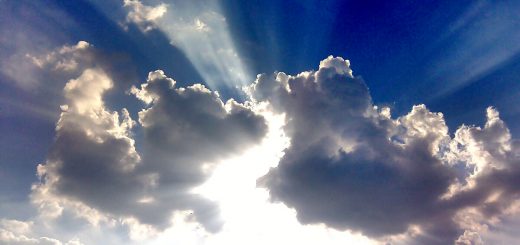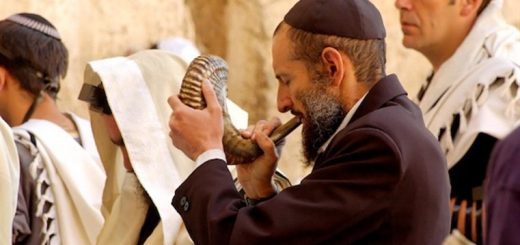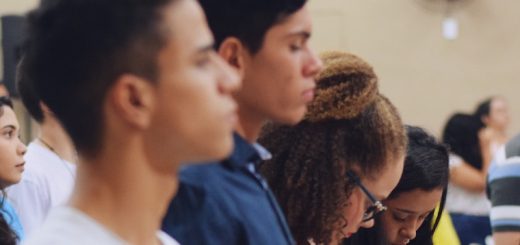Sorry, Rabbi Ellenson, but it’s not Hatred

The President of Hebrew Union College has written his latest screed denouncing the Orthodox, and, just to be sure the article is as inflammatory as possible, either he or the Forward’s editors have entitled it “Obscene Orthodox Hatred Demands a Clear Denunciation.” But he produces no evidence of Orthodox “hatred,” much as he tries to inflame the passions of his non-Orthodox and secular readers against the Orthodox.
He points to two symptoms of this “hatred,” both involving Sephardic Rabbis and congregations. In the latter example, a Sephardic congregation “threatened to disrupt” a Memorial Day ceremony if a Reform Rabbi, Michael Boyden, was introduced as HaRav and asked to say the Kel Maleh prayer in memory of the dead. It is not clear what they meant by “disruption,” but we should not leap to conclude that they planned to storm the podium. And when one actually bothers to listen, one finds that what the Orthodox Rabbi was saying was not at all unreasonable. It turns out that the organizers changed the protocol for the event, leading to objections from multiple bereaved families:
“The protocol of Yad Labanim calls for ‘El Malei Rachamim’ to be chanted by a cantor,” [the Rabbi said]. Dozens of grieving families opposed the addition of Boyden to chant the prayer, he said. “In Remembrance Day ceremonies,” Hiller continued, “you have to be sensitive to others’ feelings. I’m here 20 years, and it’s never been a grieving father [who read ‘El Malei’]. There are people who have been here 30 years who have never been asked.”
So Rabbi Ellenson makes a great noise about the fact that Rabbi Boyden is himself a bereaved father, but he ignores the feelings of the multiple bereaved families who objected — whom, according to Rabbi Hiller, numbered in the dozens.
Rabbi Reuven Hiller, the local Orthodox rabbi behind the incident, made no bones about his motivations, saying: “If he wasn’t a Reform rabbi, we’d let him do it, but with Reform rabbis, their belief in God is questionable. I’ve had long conversations with my cousin, a Reform rabbi in the U.S., and it’s a very far thing from what Judaism always was. So the Reform can’t represent the entire audience as a prayer leader. They should find someone who is in the consensus” to chant the prayer.
This was not, as Ellenson dishonestly portrays it, a face-off between “the local Orthodox Sephardic synagogue” and a bereaved father. It was a face-off between dozens of bereaved parents, and one. Nor can Ellenson dismiss those dozens as having no legitimate grounds to object. As a modern-day leader of Reform Judaism, Rabbi Ellenson cannot simply ignore the fact that Reform Judaism was founded upon the conscious rejection of all that traditional Jews hold dear, and then act with wonder and amazement that traditional Jews would consider it inappropriate to appoint a Reform Rabbi as their representative in a prayer to G-d.
Which brings us back to the first “example” of “Orthodox hatred:” that the former Israeli chief Sephardic rabbi, Mordecai Eliyahu, said that “the Holocaust was divine punishment meted out against our people on account of the sin of Reform Judaism.”
Welcome to the world of traditional Judaism, Rabbi Ellenson, where we point fingers at ourselves first. When G-d punishes the Jewish People, it is for a reason. The Torah promises us that. Jews don’t worship gods who are capricious nor evil. We pray to Kel Maleh Rachamim, G-d filled with Compassion (or Mercy), because that is who He is. We may not understand. We look at something as huge as the Holocaust, and do not understand. But we are called upon to look at our deeds and wonder why.
Clearly, Rabbi Eliyahu was not claiming that those who died deserved to die. The majority of the martyrs were observant. 80% of the Chassidic world was wiped out, and every major yeshiva and Chassidic court was either destroyed or displaced.
More accurate listeners state that Rabbi Eliyahu also did not say that this is why the Holocaust happened, but speculated upon multiple things we as a people had done wrong, this among them. Now I know that Ellenson thinks Reform did nothing wrong — but he and his brethren have tossed the old Reform out the window.
Old Reform said that G-d’s Oral Law is primitive, has no authority, and is detrimental to spiritual growth (chas milehazkir). Old Reform replaced yarmulkes, talleisim and shofars with a mixed choir, an organ and services conducted entirely in German. And just to put the icing on it, Old Reform rejected the return to the Land of Israel in absolute terms, such as “we know no fatherland except that to which we belong by birth or citizenship” and “Berlin is our Jerusalem.”
What Rabbi Eliyahu said was not diplomatic, in the extreme. But he was telling his local followers to stay strong in following the Commandments, rather than following a path that rejects them. Does a modern Reform Rabbi really think it’s worth condemning that message?




The majority of the martyrs were observant.
Interesting statistic, what is the source?
KT
‘their belief in God is questionable’
This is not true. Reform rabbis believe in God — at least every one I’ve ever met. The official platforms of the Reform movement affirm that God is central to their conception of Judaism. I used to attend a Reform synagogue and the rabbi talked about God incessantly.
The Reform movement does reject rabbinic authority including the validity of the oral torah. We Orthodox do vehemently disagree with that. The consequences of that disagreement are profound and impact greatly on how we view our relationship to God. But when we criticize others we should limit ourselves to what others actually say and/or do.
In my immediately previous post, I should have said something like, “The Reform movement rejects rabbinic authority, including the interpretation of the oral torah — and indeed the very validity of the oral torah itself”. My wording could have been interpreted as implying that the oral torah is a human creation, which I did not intend.
Yaakov Menken: Welcome to the world of traditional Judaism, Rabbi Ellenson, where we point fingers at ourselves first.
Ori: Wouldn’t pointing fingers at ourselves first, in this context, involve wondering if the Holocaust was caused by any of the sins which are common among Rabbi Eliyahu’s listeners? It seems that Rabbi Eliyahu pointed a finger at another group of Jews than his listeners.
Mr. Rich: So has noted Holocaust scholar Michael Berenbaum opined in writing (copy available upon request).
Dr. Hall: The figure stood at 90% in an internal 1972 Central Conference of American Rabbis (CCAR) survey — who are unable to profess belief in God in “the more or less traditional Jewish sense,” preferring self-descriptions like “agnostic” and “theological humanist.” In 1986, Reform leader Rabbi Paul Menitoff attributed the sparse attendance at Reform temples to the “sizeable segments of the [Reform] lay and rabbinic populations [who] do not believe in God.”
Could matters have improved since then ? I don’t have the data to answer that.
Charles Hall wrote:
“This is not true. Reform rabbis believe in God—at least every one I’ve ever met.”
If Mr. Hall wishes to rely upon his own experiences, I believe mine are equally reliable. I have met and talked many Reform rabbis and very few of them claim to believe in G-d. More importantly, when pressed as to what exactly they believed in – even those who claimed to believe in G-d fell far short of the traditional understanding of that term.
The Jewish concept of G-d is not that He wants us to do whatever our heart desires.
“The majority of the martyrs were observant.” I don’t think so.
Personally, my problem in accepting R’ Eliyahu’s words is that it’s pointless to speculate about what others’ did wrong. I agree that his intent was “speculated upon multiple things we as a people had done wrong, [Reform] among them”. But if Reform people aren’t in his audience, what’s the purpose? Discussing it among ourselves in the Orthodox world won’t lead to teshuvah. If anything, it will distract attention from those things we do need to fix. But it does still look like finger-pointing just to pick out another’s flaws, even without the much bigger question of blame.
-mi
Ori, Rabbi Eliyahu is approaching 80 (ad me’ah v’esrim), and even he was not Bar Mitzvah and obligated to do Mitzvos until the Holocaust was underway. And when it comes to Klal Yisrael, the larger congregation, there is no “we” vs. “they.” Every Jew is interconnected, and it would make no logical sense to attribute the Holocaust to all sorts of smaller things people were doing wrong, and ignore the wholesale, unprecedented discarding of Torah and Mitzvah observance by a huge segment of our nation.
Long before the War, however, a Rosh Yeshivah in Lithuania (and I hope someone can remind me who it was) told his Talmidim that if they are mevatel Torah, if they fail to study with diligence, then another Jew lights a cigarette on Shabbos in Berlin. I was not there and don’t know what Rabbi Eliyahu actually said, but I would join you in saying that the message should not be one of finger-pointing towards another group, but asking what listeners can do to “combat” destructive forces by helping our brethren towards the path of Torah — be that in learning, prayer, and/or outreach. I think that answers Micha’s concern as well.
I see. Rabbi Eliyahu’s purpose was not a rebuke (“our ancestors did X and that brought the Shoah, let’s not do that again”) but something else.
Where is it written that criticism of others never has a place?
However, criticism has to be true, timely, measured, and likely to make things better on balance than inaction or another approach would.
Rabbi Menken accuses Rabbi Ellenson of dishonesty by not providing the whole picture. However, Rabbi Menken does just that himself. He writes “This was not, as Ellenson dishonestly portrays it, a face-off between “the local Orthodox Sephardic synagogue” and a bereaved father. It was a face-off between dozens of bereaved parents, and one.”
However, he ignores some information further on in the JPost article, specifically “I and [fellow board member] Shlomi [Hayun] won’t be there,” he insisted earlier Sunday, since “we won’t lend a hand to the exclusion of a grieving father, whether he’s a Reform rabbi or an Orthodox rabbi or a sewer cleaner” Obviously then, it was more than just one. There were at least two other people in support of the Reform Rabbi.
Indeed, Rabbi Menken did not mention that there was some contraversy as to the forces behind the request for the Rabbi not to be involved in the service. In fact, it may have been only one person. It was only that person who made the claim that “Dozens of grieving families opposed the addition of Boyden to chant the prayer.”
I dont have any independent knowledge of what happened. However, Rabbi Menken presents a very biased synopsis of the JPost article, and certainly seems to use only that which supports his cause. I think he accused Rabbi Ellenson of the same think. Ironic.
sometimes when people don’t like what someone said, they blow it out of proportion when that’s not what the person meant to say. They think the person doesn’t like them and is critisizing out of hate. But really it’s Not out of hate, but out of concern. They want them to know what’s right and wrong according to the Torah, because we Jews are responsible for one another.
I understand that Reform Jews believe in G-d, however they believe that the Torah is from man and inspired by G-d, and so it needs to be changed over time since man is not perfect and doesn’t know the future. However, 1) G-d doesn’t want for us to give credit to man for something that He made. How do we know He made it Himself? Because He used it as a blueprint when making this world. And then went to different nations and asked if they want it. The others said no, but we said yes and promised to keep it. Yes G-d told Moshe word for word what to write in the 5 books, but it’s all from G-d. Both the written and oral Torah are. With the written one, He tells us what to do, and the oral one, He tells us how to do it.
2) Since it’s from G-d, it’s perfect because He see’s everything both past, present and future. Unlike man who is limited to personal opinion, G-d is objective in knowing what’s right and wrong since He see’s the whole picture. And what’s right and wrong is the same in every generation. Nobody would say that stealing use to be wrong but now it’s okay. Same thing goes with other things. We might not understand the ‘whys’ about some laws, but we should still have faith that G-d knows best like a knowledgable parent who knows more. Of course there are different interpetations and that’s fine, but it should be in a way that’s according to Jewish law. Same thing for laws between man and G-d, we still have to follow them because we are still binded to the vow we made a long time ago. For example, the laws of kosher are for our spiritual health and so they are everlasting. Yes some things like the sacrafices in the temple in Jerusalem don’t apply now because the temple in Jerusalem was destroyed. But many other laws still do apply nowadays and we should do them according to His will and not our own. It’s not about picking and choosing what we want to do or not do. It’s about doing what we are obligated to do and the way He wants us to do it. And if He punishes us for not doing as we are suppose to, then we need to take responsibility and do some introspection instead of getting upset at those who are only trying to help us understand the proper path. – If we do what we are suppose to though, then we get blessings. Remember however that with punishment or blessings, we can either receive it in this world or the next world.
Plus we should remember that these laws are for our benifit and spiritual growth.
2 points to keep in mind
1) The Union of Reform Judaism has denied membership to synagogues that deny the existence of G-d
2) Several ORthodox rabbis I know have contacted Rabbi Ellenson to express dismay at his inflamatory remarks. One thing he apparently has said in his own defense is that the title was not of his choosing, and he had a much pareve “a call for decency” as the title.